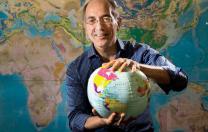Geophysical proofs are not the only kinds of evidence Mitrovica marshals to illuminate the history of sea-level rise. One of his favorite examples comes from a fellow researcher at the Australian National University, Canberra. Kurt Lambeck, a professor of geophysics, has used 2,000-year-old Roman fish tanks to illuminate changes in sea level. In an era long before refrigeration, wealthy Romans built holding tanks beside their coastal villas so they could eat fresh fish whenever they wished. Sluice gates positioned with their tops eight inches above the high-water mark let seawater in and out, flushing the tanks with the natural ebb and flow of the tides. To work, they had to be built at a precise level relative to high tide.
Lambeck, after correcting for known geophysical influences such as the ongoing changes in Earth’s shape due to the ice age, showed that there has been virtually no change in sea level at these sites since the height of the Roman empire. The finding refutes climate skeptics’ claim that sea level has been rising continuously for a long time. Had the water been rising at two millimeters per year for two millennia, these tanks would today be under four meters of water. Lambeck’s work thus underscores the significance and implications of Mitrovica’s recent finding that sea level rise has accelerated dramatically in the past two decades.









